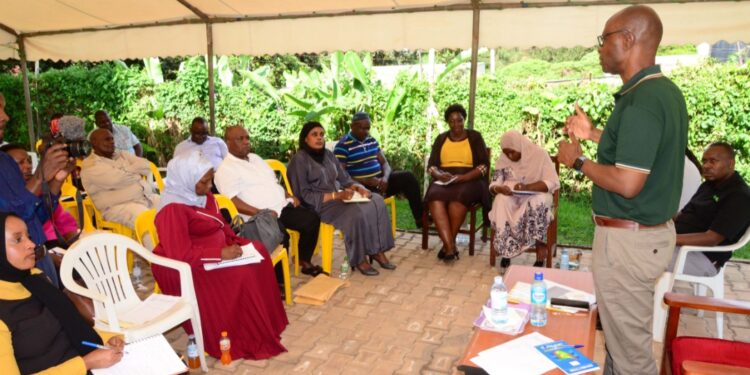The State House Anti-Corruption Unit (SHACU) has vowed to clamp down on ghost Emyooga Savings and Credit Cooperative Organizations (SACCOs) and cause prosecution of district leaders implicated in the misuse of funds.
This commitment was made during a high-level meeting held on November 15, 2024, at State Lodge, Nakasero.
The meeting was attended by senior government officials, including Resident District Commissioners (RDCs), Resident City Commissioners (RCCs), National Resistance Movement (NRM) Division Chairpersons, and district security officers.
The meeting’s focus was on addressing reports of irregularities in the disbursement and utilisation of Emyooga funds.
Investigating Irregularities:
Mr. Moses Byaruhanga, Senior Presidential Adviser on Political Affairs, pledged thorough investigations into the alleged existence of ghost SACCOs and mismanagement of funds.
Mr. Byaruhanga directed the Microfinance Support Centre (MSC) to work closely with local leaders and security officials to assess the utilisation of funds and verify the existence of SACCOs.
“We have intelligence reports indicating critical shortcomings in the management of Emyooga funds,” Mr. Byaruhanga revealed.
“These include personal use of funds, inclusion of ineligible beneficiaries, high rates of non-operational SACCOs, external interference, and lack of accountability.”
He added that SHACU would lead efforts to recover misappropriated funds and enforce compliance with eligibility criteria.
“We will implement transparent fund allocation systems, strengthen monitoring, and intensify field supervision to ensure these funds benefit intended communities,” Mr. Byaruhanga emphasised.
Funds Disbursement, Utilisation:
According to MSC, Kampala City has so far received sh17.02 billion allocated to 562 SACCOs, alongside an additional sh2.22 billion provided as seed capital to 111 SACCOs.
However, the processing of new funds has been suspended pending investigations into mismanagement and the existence of ghost SACCOs.
MSC official, Mr. William Kirunda, confirmed the suspension, stating, “The misuse of funds and ghost SACCOs must be addressed before we can resume fund disbursements.”
Leaders Raise Alarms:
Local leaders expressed their frustrations, highlighting widespread corruption and mismanagement.
Mr. Godfrey Luwaga, the NRM Chairperson for Kawempe Division, revealed that most SACCOs in his area are ghost entities.
“Only 10 SACCOs are active. Members claim they were given the funds as tokens of appreciation, while SACCO leaders have disappeared with the money,” Mr. Luwaga said.
Similarly, Mr. Nicholas Arinaitwe, the NRM Chairperson for Nakawa Division, cited lack of transparency.
“Some SACCOs have vanished, and the challenge of funds mismanagement persists,” he noted.
In Rubaga Division, the NRM Chairperson, Mr. Abdallah Kitatta accused some government officials of conniving with SACCO leaders to embezzle funds.
“This corruption must stop. These officials should be arrested,” Mr. Kitatta demanded, adding that it is mainly taxi and boda boda SACCOs that are active.
The Assistant RCC for Rubaga Division, Mr. Joseph Kiyimba, shared findings from field assessments.
“We discovered that leaders often use the money for personal purchases without consulting SACCO members or following due processes,” he said.
Capacity Building:
The Deputy Resident City Commissioner for Makindye Division, Ms. Caroline Nanshemeza, emphasised the need for education and training.
“People need to be sensitised on the proper use of these funds to ensure sustainability,” she said.
However, according to the leaders, some beneficiaries argue that the funds are insufficient. They said Veteran SACCO members in Makindye Division expressed dissatisfaction, claiming that the limited funding restricts meaningful utilisation.
Emyooga as an opportunity to boost livelihoods:
Launched in 2019, the Emyooga Presidential Initiative on Wealth and Job is aimed at uplifting communities to market-oriented production.
The program seeks to create jobs and improve livelihoods through financial support for local enterprises.
Despite its ambitious goals, the leaders said the initiative faces significant challenges such as ghost SACCOs, inadequate accountability, and limited member awareness that undermine its potential impact.
Hajjat Fatuma Katongole, Assistant RCC for Kampala City, highlighted the importance of accountability mechanisms.
“It is crucial to enforce traceability in fund distribution and strengthen SACCO resilience to achieve the program’s objectives,” she advised.
On the other hand, Mr. Byaruhanga said the government remains committed to empowering local communities through financial support.
“However, we must ensure these funds serve their intended purpose and create tangible impact.”
Disbursed funds per division:
Each SACCO is entitled to sh30m as seed capital, and additional funding of sh20m per SACCO.
The 234 SACCOs in the Central Division have so far been allocated sh7.04 billion. Additionally, 47 of these SACCOs have received additional capital amounting to sh940m with each SACCO getting sh20m. However, 63 SACCOs are reported as non-existent.
In Makindye Division, sh2.17 billion has been disbursed to 66 SACCOs, with 17 receiving additional funding. However, many SACCOs remain inactive or mismanaged.
Additionally, Nakawa Division which has 56 SACCOs, has so far been allocated sh1.72 billion, but most SACCOs in the division are reportedly ghost entities.
Kawempe Division, with 103 SACCOs was allocated sh2.98 billion, and just about 10 SACCOs are active, according to local NRM leaders and division security leaders.
For Rubaga Division, sh3.11 billion has been distributed to 207 SACCOs. Still, several SACCOs are non-functional, with reports of leaders misappropriating funds.
Do you have a story in your community or an opinion to share with us: Email us at editorial@watchdoguganda.com










